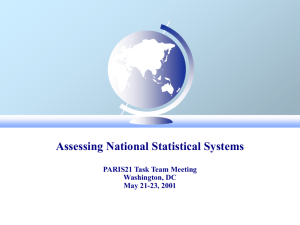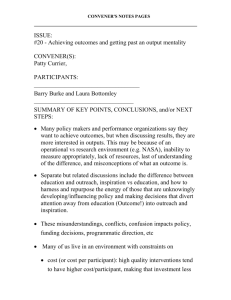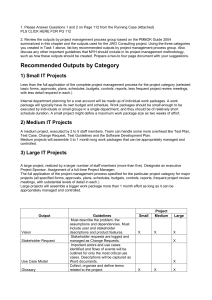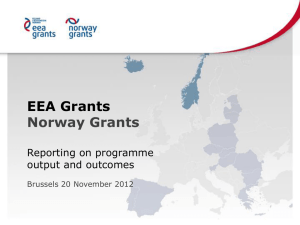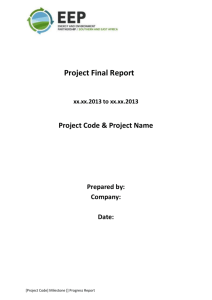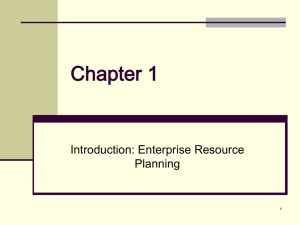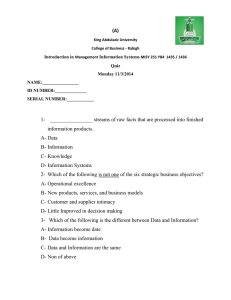PART A – Project summary
advertisement
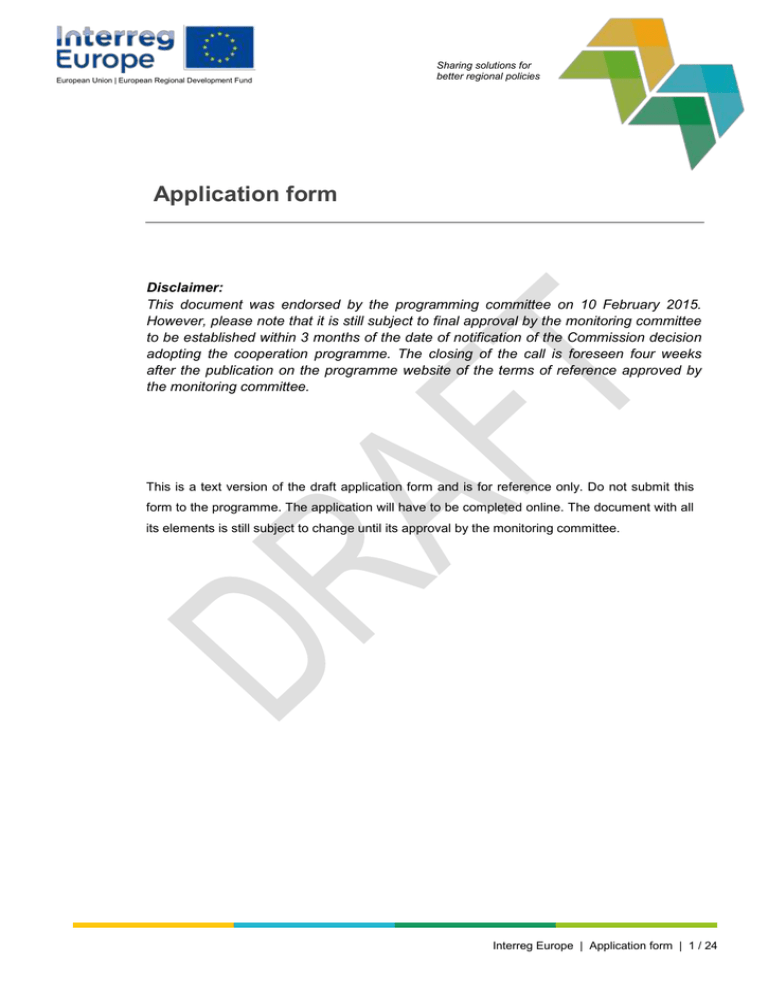
European Union | European Regional Development Fund Sharing solutions for better regional policies Application form Disclaimer: This document was endorsed by the programming committee on 10 February 2015. However, please note that it is still subject to final approval by the monitoring committee to be established within 3 months of the date of notification of the Commission decision adopting the cooperation programme. The closing of the call is foreseen four weeks after the publication on the programme website of the terms of reference approved by the monitoring committee. This is a text version of the draft application form and is for reference only. Do not submit this form to the programme. The application will have to be completed online. The document with all its elements is still subject to change until its approval by the monitoring committee. Interreg Europe | Application form | 1 / 24 Application form Contents PART A – Project summary .............................................................................. 2 A.1 Project identification................................................................................................................................. 2 A.2 Project summary ...................................................................................................................................... 2 A.3 Project budget summary .......................................................................................................................... 3 A.4 Overview of project partners .................................................................................................................... 3 Lead partner confirmation .......................................................................................................................... 4 PART B – Partnership........................................................................................ 5 B.1 Partner details .......................................................................................................................................... 5 B.2 Policy instruments addressed and territorial context ............................................................................... 7 PART C – Project description ......................................................................... 10 C.1 Brief history of the project ...................................................................................................................... 10 C.2 Issue addressed .................................................................................................................................... 10 C.3 Objectives .............................................................................................................................................. 10 C.4 Communication strategy ........................................................................................................................ 10 C.5 Project approach ................................................................................................................................... 11 C.6 Expected results and outputs of the project .......................................................................................... 11 C.7 Horizontal principles .............................................................................................................................. 13 C.8 Project management ............................................................................................................................. 13 PART D – Work plan ........................................................................................ 14 D.1 PHASE 1 ‘Interregional learning’ - Detailed work plan per period ........................................................ 14 D.2 PHASE 2 ‘Monitoring action plan implementation’- Detailed work plan per period .............................. 15 PART E – Project budget................................................................................. 19 E.1 Budget breakdown per budget line and partner .................................................................................... 19 E.2 External expertise and services ............................................................................................................. 20 E.3 Equipment .............................................................................................................................................. 21 E.4 Budget breakdown per source of funding and partner .......................................................................... 22 E.5 Spending plan ........................................................................................................................................ 23 Fields in grey are automatically filled in or calculated PART A – Project summary A.1 Project identification Project title [300 characters] Project acronym [22 characters] Name of the lead partner organisation in English Select one of the six objectives from the from the following list: Research, technological development and innovation Objective 1.1: Improving innovation infrastructure policies Objective 1.2: Improving innovation delivery policies Competitiveness of SMEs Objective 2.1: Improving SMEs competitiveness policies Low carbon economy Objective 3.1: Improving low-carbon economy policies Environment and resource efficiency Objective 4.1: Improving natural and cultural heritage policies Objective 4.2: Improving resource-efficient economy policies Specific objective Project duration Start date Phase 1 End date Phase 2 24 months Total (months) A.2 Project summary Please give a short overview of the project (in the style of a press release) and describe: the common challenge you are jointly tackling in your project; the overall objective of the project and the expected changes your project will make to the current situation; the main outputs you will produce and who will benefit from them. Please note that should the project be approved, this summary will be published on the programme’s website. [1500 characters] 2 A.3 Project budget summary Programme funding Amount Total budget National contributions Funding Public co- Private co- Total co- rate (%) financing financing financing Total eligible to ERDF ERDF Total Norway Norway Total Interreg Interreg Europe Europe Other funding Grand Total A.4 Overview of project partners Partner Organisation Country No 3 Partner budget Programme Partner funding contribution Total Lead partner confirmation By signing the application form the lead partner confirms that: The project has or will neither in whole nor in part receive any other complementary EU funding (except for the funding indicated in this application form) during the whole duration of the project. The project is in line with the relevant EU and national legislation and policies of the countries involved; The lead partner and the project partners will act according to the provisions of the relevant national and EU regulations, especially regarding Structural Funds, public procurement, state aid, environment and equal opportunities, as well as the specific provisions of the programme. The information provided in this application is accurate and true to the best knowledge of the lead partner. Name of signatory Position of signatory Lead partner’s organisation Date Signature and stamp of lead partner (if exists) 4 PART B – Partnership B.1 Partner details (see section 4.4 of the programme manual) Partner 1 Role of the partner in the project Drop down list (lead partner/partner/advisory partner) Name of organisation [200 characters] in original language [200 characters] Name of organisation in English Department/unit/division (if applicable) Drop down list (public body or body governed by public law/body governed by private Legal status law) Drop down list (national/regional/local public authority, EGTC, business support Type of partner organization, education and research institution, agency, infrastructure or public service provider, interest group, other) Countries represented (only for Selection of countries represented EGTCs) Address Town Postcode Country NUTS 1 level NUTS 2 level NUTS 3 level Legal representative Contact person 1 Phone (office) Mobile E-mail Website Contact person 2 (optional) Phone Partner E-mail financed through the (yes/no) Investment for Growth and Jobs programme 5 In case the partner is an advisory partner, please complete the following questions: What are the partner’s [1000 characters] competences and experiences in the issue addressed by the project? What is the organisation’s role in [1000 characters] the project? Partner X Role of the partner in the project Drop down list (lead partner/partner/advisory partner) Name of organisation [200 characters] in original language [200 characters] Name of organisation in English Department/unit/division (if applicable) Legal status Drop down list (public body or body governed by public law/body governed by private law) Type of partner Drop down list (national/regional/local public authority, EGTC, business support organization, education and research institution, agency, infrastructure or public service provider, interest group, other) Countries represented (only for Selection of countries represented EGTCs) Address Town Postcode Country NUTS 1 level NUTS 2 level NUTS 3 level Legal representative Contact person 1 Phone (office) Mobile E-mail Website Contact person 2 (optional) Phone E-mail 6 Partner financed through the (yes/no) Investment for Growth and Jobs programme B.2 Policy instruments addressed and territorial context (See section 4.1 and 4.3.1 of the programme manual) How many policy instruments are addressed by the project? B.2.1 Policy instrument 1 B.2.1.1 Definition and context 1. Definition Please name the policy instrument addressed Please describe the mains features of this policy instrument (e.g. objective, characteristics, priority or measure concerned) and the reason(s) why it should be improved. [500 characters] Is this policy instrument related to the national or (yes/no) regional Structural Funds operational programme (ERDF/ESF)? Is the body responsible for this policy instrument (yes/no) included in the partnership? [500 characters] Name of this responsible body Please name the responsible body and provide a support letter from this body. How do you envisage the improvement of this policy instrument (e.g. through new projects supported, through improved governance, through structural change)? [1000 characters] Proposed self-defined performance indicator (in relation to the policy instrument addressed) 2. Territorial context 7 [500 characters] What is the geographical coverage of this policy Drop down list (1/ local; 2/ regional; 3/ national; 4/ crossborder; 5/ transnational) instrument? What is the state of play of the issue addressed by this policy instrument in the territory? What needs to be improved in the territorial situation? [2000 characters] Is this issue linked to the regional innovation strategy (yes/no) for smart specialisation (RIS3)? If yes, how? [500 characters] B.2.1.2 Partner(s) relevance for policy instrument 1 How many partners address the policy instrument 1? Partner What are the partner’s competences and [500 characters] experiences in the issue addressed by this policy? What is the capacity of the partner to [500 characters] influence policy instrument 1? How will the partner contribute to the content [500 characters] of the cooperation and benefit from it? Partner What are the partner’s competences and [500 characters] experiences in the issue addressed by this policy? What is the capacity of the partner to [500 characters] influence policy instrument 1? How will the partner contribute to the content [500 characters] of the cooperation and benefit from it? B.2.1.3 Stakeholder group relevant for policy instrument 1 (See section 4.4.1 of the programme manual) Indicative list of stakeholders to be Role of the stakeholders in relation to policy instrument 1 involved 8 [500 characters] [500 characters] How will this group be involved in the project and in the interregional learning process? [2000 characters] B.2.2 Policy instrument 2 9 PART C – Project description C.1 Brief history of the project Describe how the project idea and the consortium were developed and how the partners were involved in elaborating the project proposal. [2000 characters] C.2 Issue addressed Based on the information provided in section B.2 (‘polices addressed’), explain in more general terms the regional development issue addressed by the project and, in particular: 1. How does this issue fit in the European context and in the Europe 2020 strategy? 2. How is it relevant to the Interreg Europe programme and to the selected specific objective? 3. How can interregional cooperation contribute to improve this issue? [5000 characters] C.3 Objectives Programme specific objective the project will contribute to Overall objective and sub-objectives Describe the overall objective and, if relevant, the sub-objectives of the project. The overall objective has to relate to the improvement of policies of the participating regions. [1000 characters] C.4 Communication strategy (see section 8 of the programme manual) Describe the communication strategy and the way it will contribute to achieve the above project objectives. [1000 characters] 10 Objectives Target group Activities What can communication do to Who do you need to reach? How do you plan to reach the reach project objectives? [1000 characters] communication objectives? [1000 characters] [1000 characters] C.5 Project approach (See section 4.2.1 of the programme manual) Describe the project approach to achieve the project’s objectives and to produce the intended outputs and results. In particular: 1. How do you organise the interregional learning process? 2. How do the proposed activities interlink (sequence, combination, interrelation between activities)? 3. What is the approach for developing the action plans and what is the role of the different stakeholder groups? [5000 characters] C.6 Expected results and outputs of the project (See section 4.3 of the programme manual) C.6.1 Overview of the expected outputs and results In line with the objective defined in the section “objectives”, describe in more details the main outputs and results the project intends to produce. [3000 characters] C.6.2 Indicators (See section 4.3.2 of the programme manual) Target Result indicators Number of Growth & Jobs or ETC programmes addressed by the project where measures inspired by the project will be implemented Number of other policy instruments addressed by the project where measures inspired by the project will be implemented Estimated amount of Structural Funds (from Growth & Jobs and/ or ETC) influenced 11 by the project (in EUR) Estimated amount of other funds influenced (in EUR) Policies Specific indicators Policy 1 Performance indicator Policy 2 Performance indicator Target Target Output indicators Number of policy learning events organised Number of good practices identified Number of people with increased professional capacity due to their participation in interregional cooperation activities Number of action plans developed Number of appearances in media (e.g. press) Number of new visitors to project website since last reporting period C.6.3 Innovative character (See section 4.3.3 of the programme manual) Explain the innovative character of the expected results. What are the synergies with other past or current EU projects or EU initiatives the project makes use of? For projects deriving from past Interreg experiences (follow-up projects), please clarify the added-value of these results compared to the achievements of the previous experience. [2000 characters] C.6.4 Durability of results (See section 4.3.4 of the programme manual) Describe how the durability of the project’s achievements will be ensured, specifically related to the implementation of action plans (e.g. if funding is needed, how the regions will make sure this funding will be available?). [2000 characters] 12 C.7 Horizontal principles (See section 2.7 of the programme manual) Indicate to which extent the project contributes to the following horizontal principles and agenda, and justify the choice. Sustainable development Equal opportunities and non- Type of contribution Description of the contribution neutral/ positive [1000 characters] neutral/ positive [1000 characters] discrimination Equality between men and women neutral/ positive [1000 characters] Digital agenda for Europe neutral/ positive [1000 characters] C.8 Project management (See section 4.2.1.3 of the programme manual) C.8.1 Management arrangements Describe how the management and coordination on the strategic and operational levels will be carried out in the project, specifically: 4. Structure, responsibilities and procedures for the day-to-day management and coordination including composition of the steering group and decision making process 5. Day-to-day communication within and beyond the partnership 6. Procedures for day-to-day financial management and reporting procedures [4000 characters] C.8.2 Project coordinator Y/N Will project management be externalised? C.8.3 Finance manager Y/N Will financial management be externalised? C.8.4 Communication manager Y/N Will communication management be externalised? 13 PART D – Work plan (See section 4.2.1 and 4.2.2 of the programme manual) D.1 PHASE 1 ‘Interregional learning’ - Detailed work plan per period Semester 1 Start month End month Describe the period’s activities and outputs related to a) exchange of experience, b) communication and dissemination and c) management and coordination. Specify the responsibilities of each partner with regard to the activities and also add information on the involvement of stakeholder groups. a) Exchange of experience [3000 characters] b) Communication and dissemination [1500 characters] c) Project management [1000 characters] Main outputs [300 characters] Semester 2 Start month End month Describe the period’s activities and outputs related to a) exchange of experience, b) communication and dissemination and c) management and coordination. Specify the responsibilities of each partner with regard to the activities and also add information on the involvement of stakeholder groups. a) Exchange of experience [3000 characters] b) Communication and dissemination [1500 characters] c) Project management [1000 characters] 14 Main outputs [300 characters] …… Semester X (last semester of phase 1) Start month End month Describe the period’s activities and outputs related to a) exchange of experience, b) communication and dissemination and c) management and coordination. Specify the responsibilities of each partner with regard to the activities and also add information on the involvement of stakeholder groups. a) Exchange of experience [3000 characters] b) Communication and dissemination [1500 characters] c) Project management [1000 characters] Main outputs [300 characters] Number of action plans produced Number of people with increased professional capacity D.2 PHASE 2 ‘Monitoring action plan implementation’- Detailed work plan per period Semester X+1 Start month End month Describe the period’s activities and outputs related to a) follow-up of the action plans implementation, b) communication and dissemination and c) management and coordination. Specify the responsibilities of each partner with regard to the activities and also add information on the involvement of stakeholder groups. a) Action plan implementation follow-up Each region starts the implementation of its action plan. The relevant stakeholders for the implementation are mobilised. b) Communication and dissemination 15 The partners ensure regular updates of the project website with information on the action plans implementation. c) Project management Main outputs Website updates Semester X+2 Start month End month Describe the period’s activities and outputs related to a) follow-up of action plan implementation, b) communication and dissemination and c) management and coordination. Specify the responsibilities of each partner with regard to the activities and also add information on the involvement of stakeholder groups. a) Action plan implementation follow-up Each partner monitors the action plan implementation by contacting the stakeholders and beneficiaries of the different actions. All partners meet to learn from each other by exchanging on the success and difficulties met in the implementation of their action plan. b) Communication and dissemination The partners ensure regular updates of the project website with information on the action plans implementation. c) Project management Each partner reports the progress made in implementing the action plan. The lead partner compiles the information and prepares the report for the joint secretariat. Main outputs 1 project meeting Website updates 1 annual progress report Semester X+3 Start month End month Describe the period’s activities and outputs related to a) follow-up of the action plan implementation, b) communication and dissemination and c) management and coordination. Specify the responsibilities of each partner with regard to the activities and also add information on the 16 involvement of stakeholder groups. a) Action plan implementation follow-up Each partner continues monitoring the action plan implementation and is in regular contacts with the stakeholders and beneficiaries of the different actions. b) Communication and dissemination The partners ensure regular updates of the project website with information on the action plans implementation. c) Project management Main outputs Website updates Semester X+4 Start month End month Describe the period’s activities and outputs related to a) follow-up of action plan implementation, b) communication and dissemination and c) management and coordination. Specify the responsibilities of each partner with regard to the activities and also add information on the involvement of stakeholder groups. a) Action plan implementation follow-up Each partner finalise the monitoring of the action plan implementation. Each partner discuss the results of this implementation with the relevant regional stakeholders and beneficiaries. All partners meet to exchange and draw conclusions on the two years of action plan implementation. b) Communication and dissemination In the last semester, the partners organise a final dissemination event gathering executives and policy makers from the regions and from other relevant institutions. The aim is to promote the project achievements and to disseminate the results of the action plans implementation to a large audience. The project website is updated accordingly. c) Project management Each partner summarises the level of achievement of their action plan. The lead partner compiles the information and prepares the final report for the joint secretariat. Main outputs 1 project meeting 1 high-level political dissemination event, website updates 1 annual progress report 17 1 final project report 18 PART E – Project budget (See section 7 of the programme manual) E.1 Budget breakdown per budget line and partner Total eligible Partner Name/No. Preparation costs (EUR 15,000 for LP) Staff costs Office and administration (15% of staff costs) External Travel and expertise accommodation and services costs Total Equipment partner budget Revenues (=total partner budget minus revenues) Partner 1 Partner 2 Partner 3 Partner 4 Partner n Total Interreg Europe Total all E.2 External expertise and services Number Type of costs Detailed description Select from the following list: FLC costs Project and/or financial and/or communication management 1 Meeting costs: steering group Meeting costs: dissemination event Meeting costs: exchange of experience events Meeting costs: stakeholder group Travel & accommodation costs: members of the stakeholder groups and other external bodies Publication and dissemination costs External experience support for process, the in exchange particular of the development of the regional action plan Other 2 3 n 20 Contracting partner Amount Total E.3 Equipment Number Type of costs Detailed description partner Select from the following list: 1 Office equipment Other Contracting 2 3 Total 21 Amount E.4 Budget breakdown per source of funding and partner Programme funds Partner contribution TOTAL Partner Name/No. Country (imported Partner (imported from E.1, contribution from column partner total section) eligible ERDF ERDF rate Norwegian (50% (%) (85/75/0) of total) costs) Lead partner Partner 2 Partner 3 Partner 4 Partner n Total Interreg Europe TOTAL ALL 22 from public sources Partner contribution from private sources Total partner contribution E.5 Spending plan Partner Name/No. Semester 1 Semester 2 Semester 3 Partner 1 Partner 2 Partner 3 Partner 4 Partner n Total Interreg Europe % of Total Total all % of Total 23 Semester t Total
